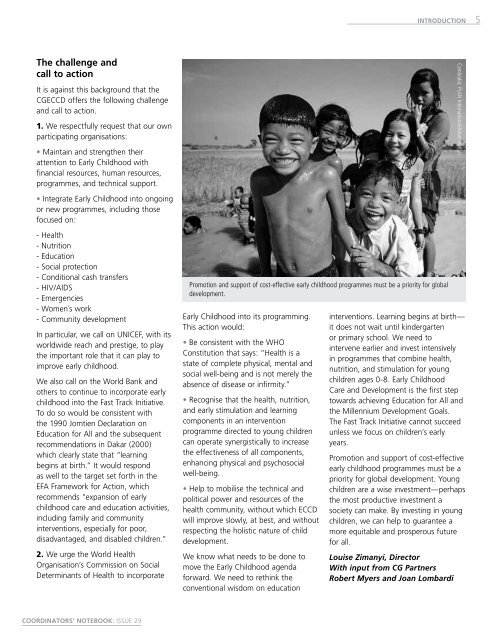A global call to action for early childhood
A global call to action for early childhood
A global call to action for early childhood
You also want an ePaper? Increase the reach of your titles
YUMPU automatically turns print PDFs into web optimized ePapers that Google loves.
introduction<br />
5<br />
The challenge and<br />
<strong>call</strong> <strong>to</strong> <strong>action</strong><br />
It is against this background that the<br />
CGECCD offers the following challenge<br />
and <strong>call</strong> <strong>to</strong> <strong>action</strong>.<br />
1. We respectfully request that our own<br />
participating organisations:<br />
• Maintain and strengthen their<br />
attention <strong>to</strong> Early Childhood with<br />
financial resources, human resources,<br />
programmes, and technical support.<br />
• Integrate Early Childhood in<strong>to</strong> ongoing<br />
or new programmes, including those<br />
focused on:<br />
- Health<br />
- Nutrition<br />
- Education<br />
- Social protection<br />
- Conditional cash transfers<br />
- HIV/AIDS<br />
- Emergencies<br />
- Women´s work<br />
- Community development<br />
In particular, we <strong>call</strong> on UNICEF, with its<br />
worldwide reach and prestige, <strong>to</strong> play<br />
the important role that it can play <strong>to</strong><br />
improve <strong>early</strong> <strong>childhood</strong>.<br />
We also <strong>call</strong> on the World Bank and<br />
others <strong>to</strong> continue <strong>to</strong> incorporate <strong>early</strong><br />
<strong>childhood</strong> in<strong>to</strong> the Fast Track Initiative.<br />
To do so would be consistent with<br />
the 1990 Jomtien Declaration on<br />
Education <strong>for</strong> All and the subsequent<br />
recommendations in Dakar (2000)<br />
which cl<strong>early</strong> state that “learning<br />
begins at birth.” It would respond<br />
as well <strong>to</strong> the target set <strong>for</strong>th in the<br />
EFA Framework <strong>for</strong> Action, which<br />
recommends “expansion of <strong>early</strong><br />
<strong>childhood</strong> care and education activities,<br />
including family and community<br />
interventions, especially <strong>for</strong> poor,<br />
disadvantaged, and disabled children.”<br />
2. We urge the World Health<br />
Organisation’s Commission on Social<br />
Determinants of Health <strong>to</strong> incorporate<br />
Promotion and support of cost-effective <strong>early</strong> <strong>childhood</strong> programmes must be a priority <strong>for</strong> <strong>global</strong><br />
development.<br />
Early Childhood in<strong>to</strong> its programming.<br />
This <strong>action</strong> would:<br />
• Be consistent with the WHO<br />
Constitution that says: “Health is a<br />
state of complete physical, mental and<br />
social well-being and is not merely the<br />
absence of disease or infirmity.”<br />
• Recognise that the health, nutrition,<br />
and <strong>early</strong> stimulation and learning<br />
components in an intervention<br />
programme directed <strong>to</strong> young children<br />
can operate synergisti<strong>call</strong>y <strong>to</strong> increase<br />
the effectiveness of all components,<br />
enhancing physical and psychosocial<br />
well-being.<br />
• Help <strong>to</strong> mobilise the technical and<br />
political power and resources of the<br />
health community, without which ECCD<br />
will improve slowly, at best, and without<br />
respecting the holistic nature of child<br />
development.<br />
We know what needs <strong>to</strong> be done <strong>to</strong><br />
move the Early Childhood agenda<br />
<strong>for</strong>ward. We need <strong>to</strong> rethink the<br />
conventional wisdom on education<br />
interventions. Learning begins at birth—<br />
it does not wait until kindergarten<br />
or primary school. We need <strong>to</strong><br />
intervene earlier and invest intensively<br />
in programmes that combine health,<br />
nutrition, and stimulation <strong>for</strong> young<br />
children ages 0-8. Early Childhood<br />
Care and Development is the first step<br />
<strong>to</strong>wards achieving Education <strong>for</strong> All and<br />
the Millennium Development Goals.<br />
The Fast Track Initiative cannot succeed<br />
unless we focus on children’s <strong>early</strong><br />
years.<br />
Promotion and support of cost-effective<br />
<strong>early</strong> <strong>childhood</strong> programmes must be a<br />
priority <strong>for</strong> <strong>global</strong> development. Young<br />
children are a wise investment—perhaps<br />
the most productive investment a<br />
society can make. By investing in young<br />
children, we can help <strong>to</strong> guarantee a<br />
more equitable and prosperous future<br />
<strong>for</strong> all.<br />
Louise Zimanyi, Direc<strong>to</strong>r<br />
With input from CG Partners<br />
Robert Myers and Joan Lombardi<br />
Cambodia: PLAN International/Adam Hin<strong>to</strong>n<br />
COORDINATORS’ NOTEBOOK: ISSUE 29
















